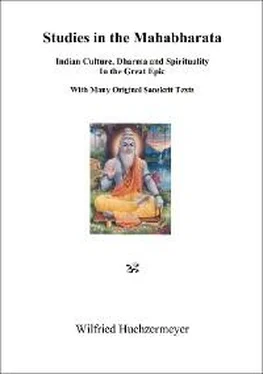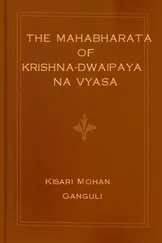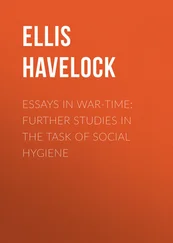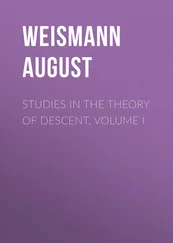Either a great breach of dharma [by not helping the Brāhmin], or death in the forest [due to the dangers of exile]. But dharma has the greater priority, even if the body dies.12
Arjuna is somewhat dramatizing the situation in his inner arguments. Breaking the family rule would indeed result in a twelve months’ exile in the forest, but we know from many other stories that there were good chances to survive such an exile. Anyhow, Arjuna decides that neglecting his kṣatriya-dharma would be the greater sin, as he had also to protect the reputation of Yudhiṣṭhira as king and head of the family. Thus, from his viewpoint, he makes an unselfish decision, accepting the possibility of his loss of life in the forest. He enters the chamber, collects the weapons and defeats the robbers. The thought that this action too might be dangerous, does not enter his mind, his superiority as a professionally trained champion fighter is beyond doubt.
When returning to his family, he finds Yudhiṣṭhira entirely undisturbed by the intrusion into the chamber. But Arjuna insists on being ‘punished’ according to the rule. Therefore, with his brother’s consent he goes to the forest where he is supposed to live as a hermit for twelve months. As it is, he was to fulfil only one part of the vow, namely to stay in exile, but his life was not that of a hermit. This can be easily excused, for when the rule of conduct was made between the Pāṇḍavas, it was understood that any interference of one of the brothers with another brother would be actuated by a lack of self-discipline and not by an urge to protect the dharma as was the case with Arjuna, an occurrence that could not be foreseen.
So we observe Arjuna now spending his life happily in exile and having many experiences with women. Perhaps they provide an outlet for feelings which may not always have found full satisfaction under the special marriage-contract with Draupadī.
Ulūpī
The first woman whom he meets on his way is Ulūpī, a Nāga-princess of great sensuous beauty. While Arjuna is bathing in the Gaṅgā, she approaches him and pulls him deep into the river, into the palace of her snake father Kauravya. It is significant and noteworthy that before their union Arjuna makes offerings into the sacrificial fire in the palace. Even in this most spontaneous of his loves, the profane is preceded by the sacred. Ulūpī then asks him for his love. Once more Arjuna faces a dharma conflict: on the one hand he was supposed to live like a hermit; on the other hand there was a general social rule of ancient times which said that a woman approaching a man with sincere love was to be satisfied.
Ulūpī resolves this intricate problem for Arjuna in a twofold way, displaying her high female intelligence: the status as a hermit, she points out, is to be understood only as renouncing all contact with Draupadī. Secondly, she herself, Ulūpī, would not be able to live without having tasted Arjuna’s love, so he has to save her:
Love me who love you, Pārtha, for this is the doctrine of the wise. If you don’t do so, I would certainly die. By giving life, o strong-armed man, observe the highest dharma. I am seeking refuge in you, best of men!13
Ulūpī appeals to Arjuna with all her heart to fulfil her as a woman by responding to her love, and he complies with her wishes, “looking to dharma as his cause.”14 But their meeting was only for one night, it was a very brief marriage. A son named Iravān was born of it. He became a valiant fighter and killed six of Śakuni’s brothers in the Great War.
To return to the story itself: it is interesting to note that here we have a love affair which is developed entirely on the background of dharma. Only when Ulūpī found the right arguments, bringing the meeting to a level where Arjuna could function in accordance with dharma, did she get what she wanted. It is the meeting of two lovers who in spite of strong emotions do not act hastily on impulse but first create an atmosphere in which their love can legitimately unfold itself.
Urvaśī
In contrast, it is very interesting to compare this episode with Arjuna’s meeting with Urvaśī in Indra’s heaven. This incident is not recorded in the established text of the Pune Critical Edition where she is merely mentioned as one of the dancers in the court.15 However, we will include the episode here, because it fits in well into this portrait of Arjuna as a lover of high standards and also forms part of the stock of popular tales in the Mahābhārata.16
Arjuna had watched Urvaśī dancing at Indra’s court with some other attractive apsarās and she had caught his eyes during her performance. Having spent sleepless hours, she resolves to approach Arjuna in his room for love, but only to find him unwilling. He explains to her that his interest in her was due to her being the wife of Purūravas, the ancient ancestor of the Kauravas. So for him she was like a mother, and that is what made him look at her. Urvaśī now tries the same tactics as Ulūpī, shifting the discussion to the level of dharma, reminding Arjuna that a man approached by a woman in love is supposed to oblige her. But this time Arjuna does not react. He cannot take her for pleasure, she remains a mother to him.
This prompts Urvaśī to curse him to become a eunuch. But Indra then modifies the curse in such a way that it will work only for the period of one year during the time when the Pāṇḍavas have to live in disguise. The curse thus turns out to be a hidden blessing. What is important in this episode is Arjuna’s refusal. His own sense of true dharma makes it impossible for him to yield to kāma, pleasure. This shows his strength of character and proves that he does use discrimination in his love affairs.
Citrāṅgadā
After his affectionate experience with Ulūpī Arjuna moves on to visit King Citravāhana of Maṇalūra. He quickly falls in love with his beautiful daughter Citrāṅgadā. There is no more question now of living the life of a hermit; perhaps Ulūpī had after all convinced him that this regulation meant only abstaining from contact with Draupadī.
Citrāṅgadā is the only child of her father, who made her a putrikā, that is to say the child from her would continue her father’s lineage, not her husband’s. Arjuna readily agrees to this condition and marries her. He stays on for a period of three months and later on becomes father of a boy named Babhruvāhana.
This brief episode has inspired Sri Aurobindo to write a poem titled Chitrangada, of which two passages will be rendered below because they bring out wonderfully Arjuna’s character, his mission, his high destiny guessed by a woman who was happy to share his close company, if only for a short while.
One morning Citrāṅgadā rises early before Arjuna; the premonition of his impending departure throws a shadow on her love-relationship with him. For the moment he is giving her all his love, but shortly he will leave her – leave her with a void whereas he can easily fill his own:
In Manipur upon her orient hills
Chitrangada beheld intending dawn
Gaze coldly in. She understood the call.
The silence and imperfect pallor passed
Into her heart and in herself she grew
Prescient of grey realities. Rising,
She gazed afraid into the opening world.
Then Urjoon felt his mighty clasp a void
Empty of her he loved and, through the grey
Unwilling darkness that disclosed her face,
Sought out Chitrangada. “Why doest thou stand
In the grey light, like one from joy cast down,
O thou whose bliss is sure? Leave that grey space,
Come hither.” So she came and leaning down,
With that strange sorrow in her eyes, replied:
“Great, doubtless, is thy love, thy very sleep
Impatient of this brief divorce. And yet
Читать дальше












